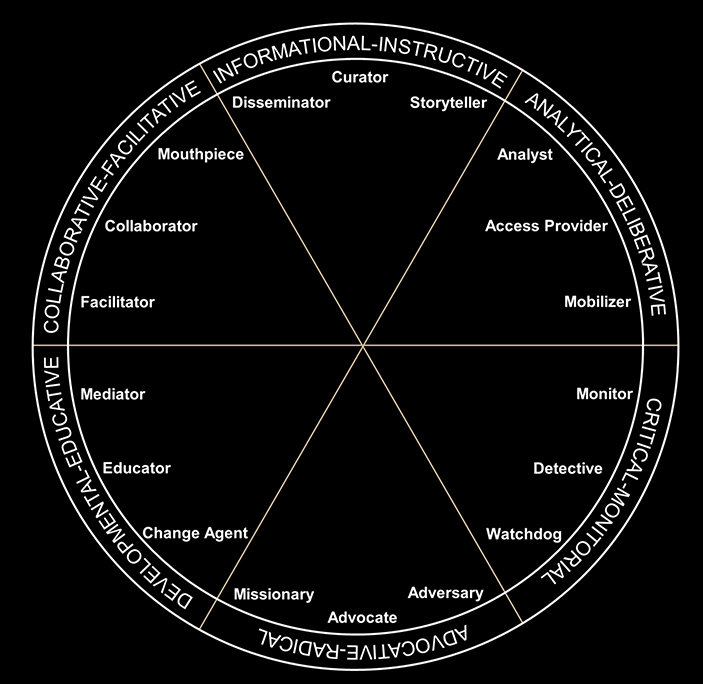Norms and ethics of journalism


Bob Woodward

Truman Capote

John Oliver

Alfred Rosenberg

Spotlight team
norm: an accepted standard of a way of behaving or doing things that most people agree with
etchic: a system of accepted beliefs that control behaviour, especially such a system based on morals
Cambridge Dictionary
Obligation
Forbidden
tell the truth
objective
impartial
unbiased
independent
share the source
corruption
fabrication
fake news
disinformation
THE PROBLEM
Who would lie to save her/his family from a tragedy?
Who would lie to ensure her/his family a better situation?
Who would lie about other's family to save her/his family from a tragedy?
Who would lie about other's family to ensure a better position for her/his family?
Dilemmas
What is good?
What is the essence of good?
Who should be the one I have to make good with?
Ethics
Deontológia
Konzekvencializmus
Kategorikus imperatívusz (Kant)
Kontraktualizmus (Rawls)
Utilitarianizmus (Mills, Bentham)
Államerkölcs
Intellektualizmus
Pragmatizmus
Erkölcs és etika nem állandó, az idők során változnak
Emotizmus/Etikai szkepticizmus
Az erkölcsi előírások nem igazolhatók
Ha valaki azért nem tesz meg valamit, mert fél a következményektől, az nem erkölcsös
Moral scepticism
1. We can't justify that a moral claim is true or good
2. Moral decisions are merely rational (Mandeville)
3. Is-ought problem (Hume)
Aim = doing good/acting for good - we assign instruments to it
But doing good is sometimes moral, sometimes not
What's the relationship to journalism?
What we would do?
We agree with the politics of a party. We receive grave proofs of corruption about a politician from this party. Would we write the story knowing that plausibly the party will lost the election against that party we consider ruinous to our country?
What we would do?
We know that a teacher from our Department abused students sexually, but the management of the Department and the University wants to cover up the case. Would we write the story knowing that the case will be a nationwide scandal which could eventually lead to unjust labelling the whole Department by specific propagandistic news outlets?
"It is very hard to lie, if we don't know the truth"
Péter Estherházy
The problem with the truth
"A lie travels around the globe, while the truth is lacing its shoes on"
Mark Twain? Jonathan Swift? Thomas Jefferson? Who?
Truth = unique, expensive to know
Journalistic Truth = get as closer as it possible
Lie = 50 shades of lie about the same topic, but for a good lie you have to know the truth
Bullshit = you don't have to know the truth
The problem with the truth

2001
1. Journalism’ first obligation is to the truth.
2. Its first loyalty is to citizens.
3. Its essence is a discipline of verification.
4. Its practitioners must maintain an independence from those they cover.
5. It must serve as an independent monitor of power.
6. It must provide a forum for public criticism and compromise.
7. It must strive to make the significant interesting and relevant.
8. It must keep the news comprehensive and in proportion.
9. Its practitioners have an obligation to exercise their personal conscience.
10. Citizens, too, have rights and responsibilities when it comes to the news.
1. TRUTH
2. INDEPENDENCE
3. IMPARTIALITY/OBJECTIVITY
4. EMPATHY/RESPONSABILITY
5. TRANSPARENCY/ACCOUNTABILITY
DILEMMAS






NORMS/ETHICS
vs.
PRACTICE
1. Journalism’ first obligation is to the truth.
2. Its first loyalty is to citizens.
3. Its essence is a discipline of verification.
4. Its practitioners must maintain an independence from those they cover.
5. It must serve as an independent monitor of power.

Hanitzsch & Vos

Hanitzsch & Vos
Thank you!
Norms and ethics of journalism
By Attila Bátorfy
Norms and ethics of journalism
- 826



